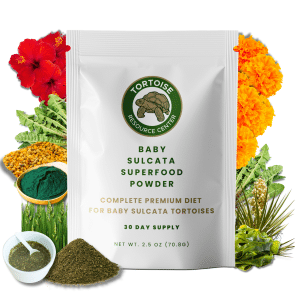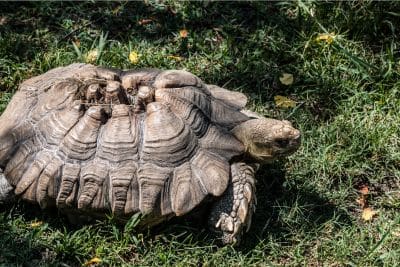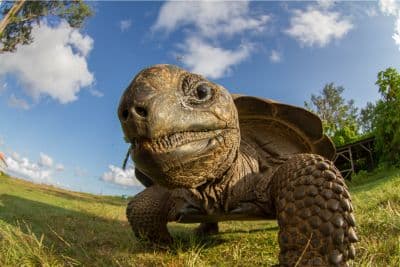When discussing the size of different tortoises, most people refer to straight-line shell length. This makes sense, as a tortoise’s length is generally the metric by which enclosure size is determined. It’s also easy for many people to estimate length.
However, it is also worth thinking about tortoise size in terms of weight.
A tortoise’s weight not only affects logistic factors, such as how difficult it will be to move your pet, but it also has a number of health ramifications. For example, you’ll need to monitor your tortoise’s weight to ensure he’s growing at the proper rate. Your vet will also want to know your tortoise’s weight if it becomes necessary to prescribe medications.
In this article, I’ll be sharing some of the average weights of different tortoise species, as well as explaining how to weigh your tortoise below.
Average Adult Tortoise Weights
Because tortoises can vary drastically in terms of length, shell shape, and body proportions, they also exhibit a wide range of different body weights. Average adult weights of some important pet tortoise species include:
- Aldabran giant tortoise (Aldabrachelys gigantea): 500 pounds (males); 250 pounds (females)
- Radiated tortoise (Astrochelys radiata): 20 to 25 pounds
- Plowshare tortoise (Astrochelys yniphora): 20 to 25 pounds
- Sulcata tortoise (Centrochelys sulcata): 80 to 110 pounds
- Red-footed tortoise (Chelonoidis carbonarius): 10 to 15 pounds
- Yellow-footed tortoise (Chelonoidis denticulatus): 15 to 20 pounds
- Speckled padloper tortoise (Chersobius signatus): 3 to 6 ounces
- Desert tortoise (Gopherus agassizii): 8 to 15 pounds
- Indian star tortoise (Geochelone elegans): 2 to 8 pounds
- Burmese star tortoise (Geochelone platynotan): 2 to 6 pounds
- Elongated tortoise (Indotestudo elongata): 6 to 8 pounds
- Bell’s hinge back tortoise (Kinixys belliana): 1 to 3 pounds
- Forest hinge back tortoise (Kinixys erosa): 1 to 3 pounds
- Pancake tortoise (Malacochersus tornieri): 14 to 18 ounces
- Asian forest tortoise (Manouria emys): 20 to 40 pounds
- Spider tortoise (Pyxis arachnoides): 6 to 12 ounces
- Leopard tortoise (Stigmochelys pardalis): 25 to 35 pounds
- Greek tortoise (Testudo graeca): 2 to 4 pounds
- Hermann’s tortoise (Testudo hermanni): 2 to 4 pounds
- Russian tortoise (Testudo horsfieldii): 8 ounces to 2 pounds
- Egyptian tortoise (Testudo kleinmanni): 5 to 12 ounces
Hatchling Tortoise Weights
The average weights provided above are helpful for understanding the size of adult animals, but tortoises obviously don’t emerge from their eggs fully grown. Most hatchling tortoises are quite small, but there is considerable variation among the different species.
For example, speckled padloper hatchlings weigh about one-quarter ounce when they take their first breaths. At the opposite end of the spectrum, Galapagos tortoise hatchlings may weigh nearly 3 ounces. The hatchlings of most other tortoise species fall somewhere in between these weights.
How to Weigh Your Tortoise
Generally speaking, tortoises will fall into one of three size classes for weighing purposes: small, medium, and large. Each size class requires a different set of tools and techniques to achieve an accurate measurement.
- Small Tortoises: You will need a digital kitchen scale that is accurate within a single gram to weigh small tortoises. Because small tortoises are easily frightened and may attempt to flee the scale, it’s typically easiest to use a clear plastic container to keep your pet contained. Simply weigh the empty container and write its weight on the side of the box. When weighing your pet, place him in the box and then subtract the weight of the box from the total to find your tortoise’s body weight.
- Medium-Sized Tortoises: Weighing a medium-sized tortoise is generally easy with a standard bathroom scale. If your tortoise is calm, you can simply place him on top of the scale. However, if he tries to move away, you may need to hold him, stand on the scale yourself, and record your combined weight. You can then subtract your weight from the total to determine your pet’s body weight.
- Large Tortoises: It can be quite challenging to weigh large tortoises, whose weights may exceed 50 pounds. Because most people won’t be able to safely and securely hold such a large tortoise, the bathroom scale approach won’t work. Instead, you’ll likely need to use the scale at your vet’s office or purchase a veterinary model yourself.
How Often Should You Weigh Your Tortoise?
Weighing your tortoise regularly is critical for helping to spot health issues before they become serious. It is also a good way to ensure that your tortoise is growing at a regular, normal pace.
However, because young tortoises grow quickly while mature tortoises grow very slowly (if at all), it is important to weigh young tortoises more frequently than their older counterparts. Typically, this means weighing tortoises who’re less than 4 or 5 years of age once each week. On the other hand, mature adults can be weighed once per month.
Ideally, you should try to weigh your tortoise on an empty stomach. The weight of any food or – more importantly, water – in his digestive tract could lead to inaccurate weights. However, in practice, this isn’t always possible.
Given this, it is important not to panic if your tortoise’s weight fluctuates significantly during a routine weighing session. Simply record the number, and then check again the next week. If the discrepancy doesn’t resolve itself, contact your vet.
Can Tortoises Become Obese?
While it isn’t as common a problem as it is with some other animals, thanks to their largely vegetarian diet, tortoises can become overweight.
This is likely incredibly rare in the wild, as tortoises not only engage in a lot of activity during their daily lives, but they must also find all of the food they consume on their own (which is not always easy). By contrast, captive tortoises rarely get as much exercise as their free-living counterparts, and they’re effectively provided with unlimited food. Accordingly, obesity does strike pet tortoises at times, which often leads to further health problems.
This illustrates another reason it is important to weigh your tortoise regularly and visit your vet routinely. Your vet will likely be able to spot the signs of obesity (which are somewhat difficult for beginning tortoise keepers to discern) and recommend a safe and effective weight-loss strategy.
The Donoghue Ratio
In 1997, veterinarian Susan Donoghue proposed a ratio tortoise keepers could consider when trying to determine whether or not their pet was at a healthy body weight. The ratio, which has become known as the Donoghue ratio, takes the following form:
tBMI= cWTcm/SCLcm^3 x 0.191
- tBMI stands for tortoise body mass index
- SCLcm stands for straight line carapace length in centimeters
When you calculate this formula using your tortoise’s metrics, you’ll obtain a number varying from about 0.5 to 1.5. Scores around 1.0 indicate your tortoise is at a healthy body weight. Scores significantly lower than this indicate your pet is underweight; scores above it indicate that your pet may be overweight.
It should be noted keepers have varying opinions on the efficacy of this formula. While some find it helpful, others argue that it completely ignores the differences in body shape between tortoises of different species and sex (some tortoise species exhibit sexual dimorphism, with males and females having different body shapes).
Are You Starving Your Tortoise?
Save 10% on premium tortoise food and supplements from Tortoise Resource Center on Amazon now using code BUYNOWGET10

Sulcata Vitamin & Mineral Topper Supplement
30-Day Supply | 2 oz (56 g)
$24.99

Baby Sulcata Tortoise Superfood Powder
30-Day Supply | 2.5 oz (70.8 g) Bag
$24.99
The Maximum Recorded Tortoise Weight
The largest individual tortoise ever weighed was a Galapagos tortoise (Chelonoidis niger) named Goliath, who lived at Life Fellowship Bird Sanctuary, in Seffner, Florida from 1960 to 2002.
Goliath was a massive animal. He measured 4.5 feet long, and the top of his shell sat 2 feet and 3 inches above the ground when he was resting.
But his weight was what earned him a spot in the Guinness Book of World Records; he weighed 920 pounds shortly before his death – that’s nearly double the average weight of an adult male Aldabra tortoise!
Citations
- San Diego Zoo – Galapagos Tortoise
- The Tortoise Table – Weighing and Measuring
- Tortoise Library – Healthy Weight and Size
- Guinness World Records – Largest Tortoise


